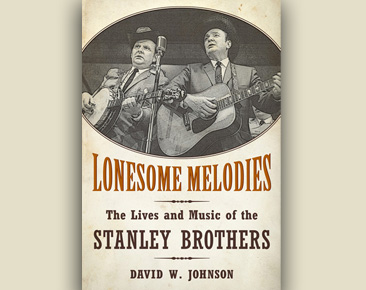
 The level of excitement peaks when anticipating a book about one of the elite members of our bluegrass community.
The level of excitement peaks when anticipating a book about one of the elite members of our bluegrass community.
Such was the case when there was news of the completion of David W. Johnson’s book about the Stanley Brothers, Lonesome Melodies: The Lives and Music of the Stanley Brothers, published by the University Press of Mississippi.
This is the first such work about the originators of “old-time mountain music, what they call bluegrass,” but it is more than that as the book does well in placing the brothers’ activities in context, citing elements of the economic difficulties for people living in the hollows and on the mountain-sides of Appalachia in the 1920s and 1930s; the trials, tribulations and temptations of a working bluegrass band emerging in the late 1940s on through most of the two decades that they brothers were together, the change from Monroe acolytes to a band with its own personality and repertoire; the effects of radio and television – particularly the recording for each medium; the evolution of the recording business, records themselves and song copyright; and uncertainty of work in the radio’s catchment area, leading to them periodically having to move on as they ‘played out’ the region.
Johnson doesn’t pull any punches in discussing Carter Stanley’s alcoholism and reports that both the brothers fathered a child out of wedlock. Perhaps we were all young and foolish at one time.
Sadly, there are many deficiencies in this book; there appears to have been very little editorial input as I am effectively doing proof-reading that should have been done by the publisher. Also, there are a significant number of errors, omissions and questionable information and assertions.
For example, there isn’t any mention of Big Spraddle Creek, long recognized as the brothers’ birthplace and confirmed as such in Ralph Stanley’s autobiography. The third recording session for Rich-R-Tone did not take place in Radio WOPI studios; recent research reveals that it took place at Radio WCYB in July 1948.
The author states that the Stanley Brothers switched from Mercury to King Records, when in fact they moved on to Starday Records, even having four singles released with the Mercury-Starday label under the arrangement that temporarily tied the two organizations together. The LP Country Pickin’ and Singin’ was a Mercury release, not a Starday album. One of the brothers’ best known songs Could You Love Me One More Time is erroneously titled Let Me Love You …..
Johnson speculates that the brothers shied away from any admiration of the Delmore Brothers for fear of lacking originality, but they performed and recorded as precise a copy of Bill Monroe’s Molly and Tenbrook as they could manage. Also the author takes the view that the Stanley Brothers were short of material for their final session for Columbia (in April 1952), when most would say never give a label that you’re leaving your best material. Their next recording session – for Rich-R-Tone – featured songs that they were very anxious to record (according to label boss Jim Stanton) and the first for Mercury – another major label – in August 1953 was “hot,” an “understatement” according to author Bob Artis in his book Bluegrass.
Incidentally, the author states that there was a reworking of I’m A Man of Constant Sorrow at the April 1952 session, but it was recorded in November 1950; this yet further invalidates his point.
I could go on and on!
There’s no doubt that the author has made an honest attempt but the book, nonetheless, is a disappointment to me.
David Johnson is making some revisions with a view to these being included in a paperback version of the book, due in about a couple of years. I look forward to being able to read that.







